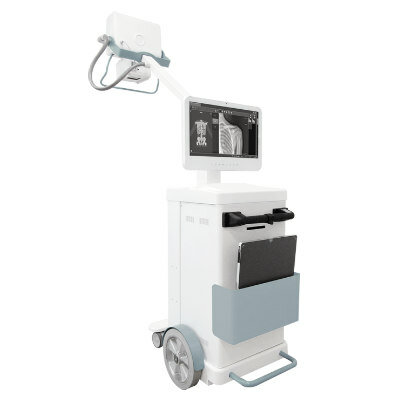Ultrasound Adoption in Primary Care to Become Widespread within Five Years, Reveals Study
|
By MedImaging International staff writers Posted on 17 Nov 2023 |

A survey involving over 150 physicians from the United States has shed light on the current trends and challenges in the adoption and use of point-of-care ultrasound (POCUS). The survey delved into issues such as the limitations of existing POCUS solutions, the potential benefits of handheld POCUS devices, and the transformative role of emerging technologies like artificial intelligence (AI) in enhancing medical imaging, particularly in the field of primary care.
One of the key findings of the 2023 Survey Report: Unlocking Point-of-Care Ultrasound by Exo Inc. (Santa Clara, CA, USA) was the slow pace of POCUS adoption across the healthcare spectrum. The report highlights the primary challenges faced by healthcare providers, including poor image quality and the difficulty of integrating POCUS devices with existing hospital IT infrastructure, like PACS and electronic health records (EHR). This complexity not only makes training on POCUS devices challenging but also leads to cumbersome processes for documenting, storing, and billing ultrasound exams. The survey revealed that a mere 68% of ultrasound exams are documented, raising concerns about compliance and legal exposure, while only half of these documented exams are actually billed, signifying a significant loss of revenue for healthcare systems.
Handheld POCUS devices, recognized for their simplicity and cost-effectiveness compared to traditional cart-based systems, are seen as a solution to the accessibility issue in medical imaging. An overwhelming 88% of survey respondents believe that the availability of handheld devices will significantly boost the adoption of POCUS. This could have far-reaching implications, especially in areas where access to essential health services, including medical imaging, is limited. The integration of AI in POCUS devices is also a significant development. AI can assist in image capture and interpretation by referencing a vast database of ultrasound images, potentially enabling a broader range of healthcare providers to use ultrasound technology. According to the survey, 79% of respondents feel that AI will positively impact POCUS, with 63% believing it will streamline image interpretation. This AI assistance is crucial in reducing operator dependency and enhancing the accuracy and consistency of imaging.
In primary care, the use of handheld POCUS devices is particularly promising. These devices offer greater accessibility and affordability, making them suitable for primary care settings that often operate with limited space and budget. The survey indicates that 61% of respondents consider it important for primary care providers to adopt handheld POCUS devices, and half believe that their use in primary care will become mainstream within five years. The advancement of AI and the development of handheld devices are expected to facilitate the wider use of ultrasound imaging across various healthcare settings.
“POCUS is critical for a more equitable and healthier world. These survey results validate just how severely caregivers are craving a new medical imaging approach. That’s why Exo has built a simple and accessible ecosystem to deliver immediate answers at the point of care," said Sandeep Akkaraju, CEO and Co-Founder of Exo. “Our ecosystem combines high-performance imaging to retrieve instant answers in any setting, workflow software to seamlessly document and bill ultrasound exams in seconds from anywhere, and AI to easily acquire consistent and accurate images in real-time. Medical imaging as we know it has entered a new age.”
Related Links:
Exo Inc.
Latest Industry News News
- Bayer and Google Partner on New AI Product for Radiologists
- Samsung and Bracco Enter Into New Diagnostic Ultrasound Technology Agreement
- IBA Acquires Radcal to Expand Medical Imaging Quality Assurance Offering
- International Societies Suggest Key Considerations for AI Radiology Tools
- Samsung's X-Ray Devices to Be Powered by Lunit AI Solutions for Advanced Chest Screening
- Canon Medical and Olympus Collaborate on Endoscopic Ultrasound Systems
- GE HealthCare Acquires AI Imaging Analysis Company MIM Software
- First Ever International Criteria Lays Foundation for Improved Diagnostic Imaging of Brain Tumors
- RSNA Unveils 10 Most Cited Radiology Studies of 2023
- RSNA 2023 Technical Exhibits to Offer Innovations in AI, 3D Printing and More
- AI Medical Imaging Products to Increase Five-Fold by 2035, Finds Study
- RSNA 2023 Technical Exhibits to Highlight Latest Medical Imaging Innovations
- AI-Powered Technologies to Aid Interpretation of X-Ray and MRI Images for Improved Disease Diagnosis
- Hologic and Bayer Partner to Improve Mammography Imaging
- Global Fixed and Mobile C-Arms Market Driven by Increasing Surgical Procedures
- Global Contrast Enhanced Ultrasound Market Driven by Demand for Early Detection of Chronic Diseases
Channels
Radiography
view channel
Novel Breast Imaging System Proves As Effective As Mammography
Breast cancer remains the most frequently diagnosed cancer among women. It is projected that one in eight women will be diagnosed with breast cancer during her lifetime, and one in 42 women who turn 50... Read more
AI Assistance Improves Breast-Cancer Screening by Reducing False Positives
Radiologists typically detect one case of cancer for every 200 mammograms reviewed. However, these evaluations often result in false positives, leading to unnecessary patient recalls for additional testing,... Read moreMRI
view channel
PET/MRI Improves Diagnostic Accuracy for Prostate Cancer Patients
The Prostate Imaging Reporting and Data System (PI-RADS) is a five-point scale to assess potential prostate cancer in MR images. PI-RADS category 3 which offers an unclear suggestion of clinically significant... Read more
Next Generation MR-Guided Focused Ultrasound Ushers In Future of Incisionless Neurosurgery
Essential tremor, often called familial, idiopathic, or benign tremor, leads to uncontrollable shaking that significantly affects a person’s life. When traditional medications do not alleviate symptoms,... Read more
Two-Part MRI Scan Detects Prostate Cancer More Quickly without Compromising Diagnostic Quality
Prostate cancer ranks as the most prevalent cancer among men. Over the last decade, the introduction of MRI scans has significantly transformed the diagnosis process, marking the most substantial advancement... Read moreNuclear Medicine
view channel
New SPECT/CT Technique Could Change Imaging Practices and Increase Patient Access
The development of lead-212 (212Pb)-PSMA–based targeted alpha therapy (TAT) is garnering significant interest in treating patients with metastatic castration-resistant prostate cancer. The imaging of 212Pb,... Read moreNew Radiotheranostic System Detects and Treats Ovarian Cancer Noninvasively
Ovarian cancer is the most lethal gynecological cancer, with less than a 30% five-year survival rate for those diagnosed in late stages. Despite surgery and platinum-based chemotherapy being the standard... Read more
AI System Automatically and Reliably Detects Cardiac Amyloidosis Using Scintigraphy Imaging
Cardiac amyloidosis, a condition characterized by the buildup of abnormal protein deposits (amyloids) in the heart muscle, severely affects heart function and can lead to heart failure or death without... Read moreGeneral/Advanced Imaging
view channel
New AI Method Captures Uncertainty in Medical Images
In the field of biomedicine, segmentation is the process of annotating pixels from an important structure in medical images, such as organs or cells. Artificial Intelligence (AI) models are utilized to... Read more.jpg)
CT Coronary Angiography Reduces Need for Invasive Tests to Diagnose Coronary Artery Disease
Coronary artery disease (CAD), one of the leading causes of death worldwide, involves the narrowing of coronary arteries due to atherosclerosis, resulting in insufficient blood flow to the heart muscle.... Read more
Novel Blood Test Could Reduce Need for PET Imaging of Patients with Alzheimer’s
Alzheimer's disease (AD), a condition marked by cognitive decline and the presence of beta-amyloid (Aβ) plaques and neurofibrillary tangles in the brain, poses diagnostic challenges. Amyloid positron emission... Read more.jpg)
CT-Based Deep Learning Algorithm Accurately Differentiates Benign From Malignant Vertebral Fractures
The rise in the aging population is expected to result in a corresponding increase in the prevalence of vertebral fractures which can cause back pain or neurologic compromise, leading to impaired function... Read moreImaging IT
view channel
New Google Cloud Medical Imaging Suite Makes Imaging Healthcare Data More Accessible
Medical imaging is a critical tool used to diagnose patients, and there are billions of medical images scanned globally each year. Imaging data accounts for about 90% of all healthcare data1 and, until... Read more
Global AI in Medical Diagnostics Market to Be Driven by Demand for Image Recognition in Radiology
The global artificial intelligence (AI) in medical diagnostics market is expanding with early disease detection being one of its key applications and image recognition becoming a compelling consumer proposition... Read moreIndustry News
view channel
Bayer and Google Partner on New AI Product for Radiologists
Medical imaging data comprises around 90% of all healthcare data, and it is a highly complex and rich clinical data modality and serves as a vital tool for diagnosing patients. Each year, billions of medical... Read more


















